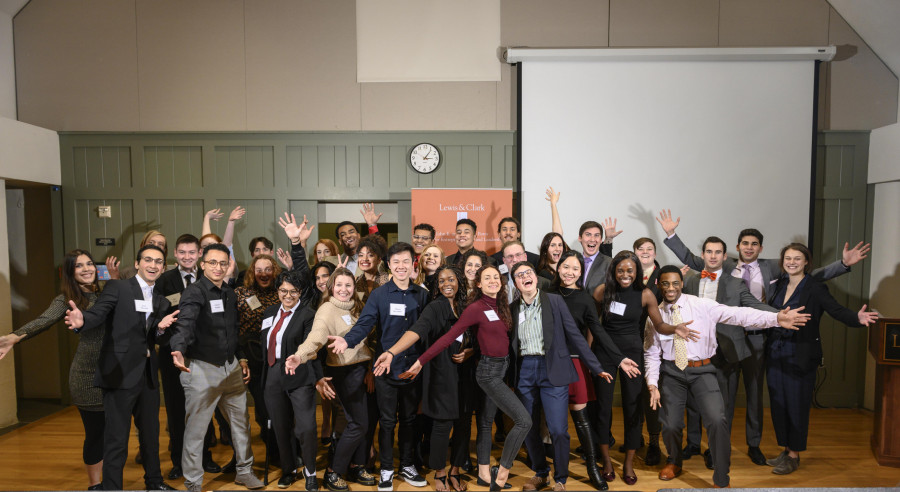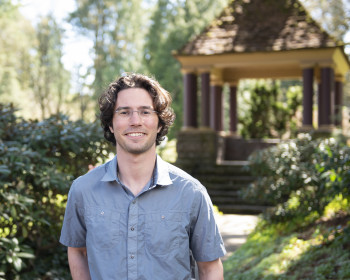Winterim Bridges the Liberal Arts and Entrepreneurship
(This story was updated on January 26. The original story can be found below.)
After four days of virtually learning, brainstorming, prototyping, debating, networking, and rehearsing, students presented their start-up ideas at Winterim’s annual pitch competition.
“I learned a lot of really great practical, real world knowledge that isn’t typically found in a classroom,” said Bay Area native Andrew Steinberg BA ’21. “It was amazing networking and meeting professionals, and I’m really excited to continue speaking with them even after Winterim is over.”
The winning pitch came from environmental studies major Aidan O’Connor BA ’23, psychology major Andrew Steinberg BA ’21, and Hispanic studies major Jo Tabacek BA ’20 for their company “Farmarketer”— a way to develop a produce distribution company acting as a two-way marketplace in the Willamette Valley, with a focus on getting produce directly from small and mid-sized farmers to markets, including local grocery stores, and restaurants.
“I was hesitant to agree to this idea right away, but the more we worked on Farmarketers the more I fell in love with our idea,” said O’Connor, from Sun Prairie, Wisconsin. “Being surrounded by that many passionate students and mentors allowed me to do far more than I thought I was capable of.”
Two teams won entry to the InventOR Inventor Collegiate Challenge, a competition for college and university students from across Oregon who will go on to compete for $25,000 in prizes to fund their innovative ideas.
The first team, consisting of political science major Nick Lombardi BA ’21, rhetoric and media studies major Shane Lynette BA ’23, and physics major Hayden Moses BA ’22, pitched “Alpha Mask.” These Lewis & Clark student athletes created a mask that will allow athletes optimal breathing capability, while maintaining maximum comfort. The second team, made up of economics major Grace Ralston BA ’21, psychology major Kyle Rauzi BA ’22, and rhetoric and media studies major Cameron Stewart BA ’23, presented their company “Bulle Voyage” with the mission to produce high quality customizable shampoo and conditioner that comes in tablet form in refillable bottles.
“This was my first Winterim, and I look forward to doing it again as it was a truly unforgettable experience,” said Lynette, a native of Bellingham, Washington. “I’ve never participated in such an immersive program that teaches us so much while simultaneously giving us the resources and guidance to pursue our own ideas.”
For the category of “Best Comprehension of an Idea,” economics major John Thoma BA ’21, psychology major Amy Natori BA ’21, and philosophy major Liam Kruchten BA ’24 won for their idea to create a network of vetted, trained, and certified healthcare practitioners for BIPOC and LGBTQ+ people. They would train health practitioners to treat specific demographics and through a specific filter (on their app), give patients in this demographic access to find care personalized to their needs.
“We took a huge chance by taking Winterim virtual,” said Chrys Hutchings, associate director of the Bates Center. “But in the Bates Center, we don’t quit when something is hard. Instead, we inject the entrepreneurial mindset and ask ourselves ‘How can we make this work?’ ”
This update was written by Yancee Gordon BA ’21.

From January 11 through January 15, 21 Lewis & Clark students will immerse themselves in the study of entrepreneurship and leadership through Winterim. Winterim is a fast-paced and supportive experience where students collaborate in small groups to research, create, develop, and pitch a venture. Students learn entrepreneurial and life-skills from inspirational speakers, mentors, and leaders in the for-profit and nonprofit professional community. Over 50 professionals – including a number of Lewis & Clark alumni – serve as speakers, mentors and judges for our 21 students during the weeklong program.
As this year’s Winterim will be entirely virtual, organizers are excited to be able to open up six talks to the broader Lewis & Clark community, including alumni, parents, and friends. To learn more about and register for these special open sessions, visit the registration page.
One of the open sessions, The Farmer’s Advocate, features a talk by, and discussion with Beth Ford, President and CEO of the Fortune 200 brand, Land O’Lakes, Inc. The $14 billion company is a nearly century-old farmer-owned cooperative that believes closing the growing rural-urban divide should matter to everyone. This virtual fireside chat will be moderated by student-athlete and Pamplin Society Fellow Qwynci Bowman ’23. The conversation will focus on the importance of innovative thinking and immediate action in ensuring our rural communities can connect, thrive and continue to provide a safe and affordable food supply for a growing world population.
Led by Professor of Psychology Brian Detweiler-Bedell, the John E. and Susan S. Bates Center for Entrepreneurship and Leadership is designed to help students translate their liberal arts training to be leaders for impact. It is open to all years and all majors, regardless of prior participation in programming and classes. And last spring, the College approved the creation of a minor in entrepreneurial leadership and innovation. Students interested in pursuing a minor in entrepreneurship will need to complete required and elective coursework and one internship or pre-professional practicum experience. Courses explore innovation, design thinking; leadership, and sustainability and entrepreneurship.
“The Bates Center provides skill sets, context, a network, and experiential opportunities so that students proactively learn to translate their liberal arts skills as they prepare for post-college life,” said Bates Center Associate Director Chrys Hutchings. “We believe the entrepreneurial mindset, grounded in the critical thinking, analysis, and cultural empathy of liberal arts, is not only helpful to a changing world and economy, but is an imperative.”
More Newsroom Stories
Public Relations is located in McAfee on the Undergraduate Campus.
MSC: 19
email public@lclark.edu
voice 503-768-7970
Public Relations
Lewis & Clark
615 S. Palatine Hill Road MSC 19
Portland OR 97219

